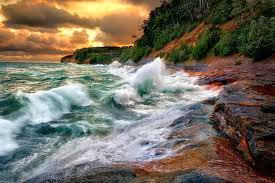The Song of Hiawatha and the Upper Peninsula of Michigan
This upper Michigan peninsula, and in particular, the
Pictured Rocks on Lake superior near
Munsing, was the site of the poem.
We never got to see these
rocks, but have definitely put the Upper Peninsula on the list of places we
would like to visit and stay longer. These pictures come from other sources…
Henry Wadsworth Longfellow published his poem, The Song of Hiawatha in 1855. It is credited with being the first American epic poem composed completely with North
American materials and no European influence. The meter he chose, however, was a rhythm familiar to those
of Finnish descent who made up a great portion of the Upper Peninsula. And still do!
Longfellow mixed a lot of different Indian traditions to
create his poem. He relied heavily
on a man named Henry Schoolcraft who was an Indian agent, and whose name we
also ran across frequently.
The Ojibwe Indian’s oral traditions greatly influenced the poem, and 50
years after its publication, one of Longfellows daughters made a pilgrimage to
the Pictured Rocks area at the invitation of the Ojibwe Indians, who considered
her father to have preserved their history. The poem gave them a great deal of
solace in the loss of their culture.
Ironically,
Longfellow himself never saw the area! Here’s the invitation that daughter Alice Longfellow received written on a
piece of birch bark.
“Ladies: We loved your father. The memory of our people will never die
as long as your father’s song lives, and that will live forever. Will you and
your husbands and Miss Longfellow come and see us and stay in our royal wigwams
on an island in Hiawatha’s playground, in the land of the Objibways? We want
you to see us live over again the life of Hiawatha in his own country.”
You can read her story here: http://www.mynorth.com/My-North/December-2008/The-Trip-to-Hiawatha/index.php?cparticle=1&siarticle=0#artanc
The Song of Hiawatha was an immediate success. It has been recited by countless school
children, and has been the subject of plays, movies, symphonies, paintings, etc. and it endures to this day.
By the shores of Gitche Gumee,
By the shining Big-Sea-Water,
Stood the wigwam of Nokomis,
Daughter of the Moon, Nokomis.
Dark behind it rose the forest,
Rose the black and gloomy pine-trees,
Rose the firs with cones upon them;
Bright before it beat the water,
Beat the clear and sunny water,
Beat the shining Big-Sea-Water.





No comments:
Post a Comment